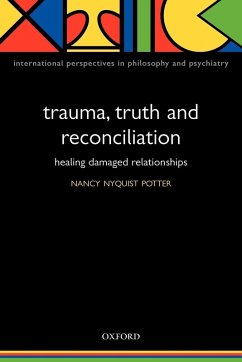Some chapters also look at how healing can occur when power imbalances exist, how to understand and address evil, genocide, and war. Finally, the book examines the importance of relational models of human interaction to thinking about trauma and healing, and how aboriginal models for healing can contribute to our understanding of trauma and forgiveness. Throughout, each contributor considers the psychological toll of trauma on both victims and perpetrators of wrongdoing and critically inquires into value systems that enhance or inhibit healing. Several authors draw on real-life cases to support their arguments, and others provide a rich theoretical framework within which readers can think through various approaches and models in a critical manner. This highly original and thought-provoking collection of articles by authors in psychiatry, psychology, philosophy, and theology is unique in its emphasis on systems of oppression that intersect with anguish and moral uncertainty.
People do great wrongs to each other all the time, sometimes deliberately, sometimes accidentally. Many within the fields of mental health are centrally involved in helping people to heal from traumatic events and to come to terms with wrongs done to them by others. However, there is surprisingly little in the way of guidance, few texts that situate healing from trauma or evildoing within a combined political and philosophical context. This book looks at how people,communities, and nations can address great wrongs and how they can heal from them - taking into consideration how differences in cultures, histories, and group expectations affect the possibilities for healing.The book examines the merits of forgiveness and reconciliation in the context of civic and interpersonal relationships - looking at the role of the law compared to extra-legal and therapeutic approaches to individual and collective, personal and social, healing.Topics include gendered norms for forgiveness, the role of narrative in contrast to a search for truth when conflicts arise, and an analysis of the conception of truth that undergirds truth and reconciliation commissions. Some chapters also look at how healing can occur when power imbalances exist, how to understand and address evil, genocide, and war. Finally, the book examines the importance of relational models of human interaction to thinking about trauma and healing, and how aboriginalmodels for healing can contribute to our understanding of trauma and forgiveness. Throughout, each contributor considers the psychological toll of trauma on both victims and perpetrators of wrongdoing and critically inquires into value systems that enhance or inhibit healing. Several authors draw onreal-life cases to support their arguments, and others provide a rich theoretical framework within which readers can think through various approaches and models in a critical manner.This highly original and thought-provoking collection of articles by authors in psychiatry, psychology, philosophy, and theology is unique in its emphasis on systems of oppression that intersect with anguish and moral uncertainty.
People do great wrongs to each other all the time, sometimes deliberately, sometimes accidentally. Many within the fields of mental health are centrally involved in helping people to heal from traumatic events and to come to terms with wrongs done to them by others. However, there is surprisingly little in the way of guidance, few texts that situate healing from trauma or evildoing within a combined political and philosophical context. This book looks at how people,communities, and nations can address great wrongs and how they can heal from them - taking into consideration how differences in cultures, histories, and group expectations affect the possibilities for healing.The book examines the merits of forgiveness and reconciliation in the context of civic and interpersonal relationships - looking at the role of the law compared to extra-legal and therapeutic approaches to individual and collective, personal and social, healing.Topics include gendered norms for forgiveness, the role of narrative in contrast to a search for truth when conflicts arise, and an analysis of the conception of truth that undergirds truth and reconciliation commissions. Some chapters also look at how healing can occur when power imbalances exist, how to understand and address evil, genocide, and war. Finally, the book examines the importance of relational models of human interaction to thinking about trauma and healing, and how aboriginalmodels for healing can contribute to our understanding of trauma and forgiveness. Throughout, each contributor considers the psychological toll of trauma on both victims and perpetrators of wrongdoing and critically inquires into value systems that enhance or inhibit healing. Several authors draw onreal-life cases to support their arguments, and others provide a rich theoretical framework within which readers can think through various approaches and models in a critical manner.This highly original and thought-provoking collection of articles by authors in psychiatry, psychology, philosophy, and theology is unique in its emphasis on systems of oppression that intersect with anguish and moral uncertainty.
This is not a handbook of 'How to do forgiveness', nor a self-help guide; rather, it is an exploration of why forgiveness seems so often to be a vital component of the healing process and of what happens when forgiveness does not happen. By combining insights from philosophy, sociology and psychology, this volume is a valuable addition to the literature on conflict, and a useful resource for anyone encountering traumatic situations where forgiveness may prove helpful in the journey towards recovery. Mental Health Today








